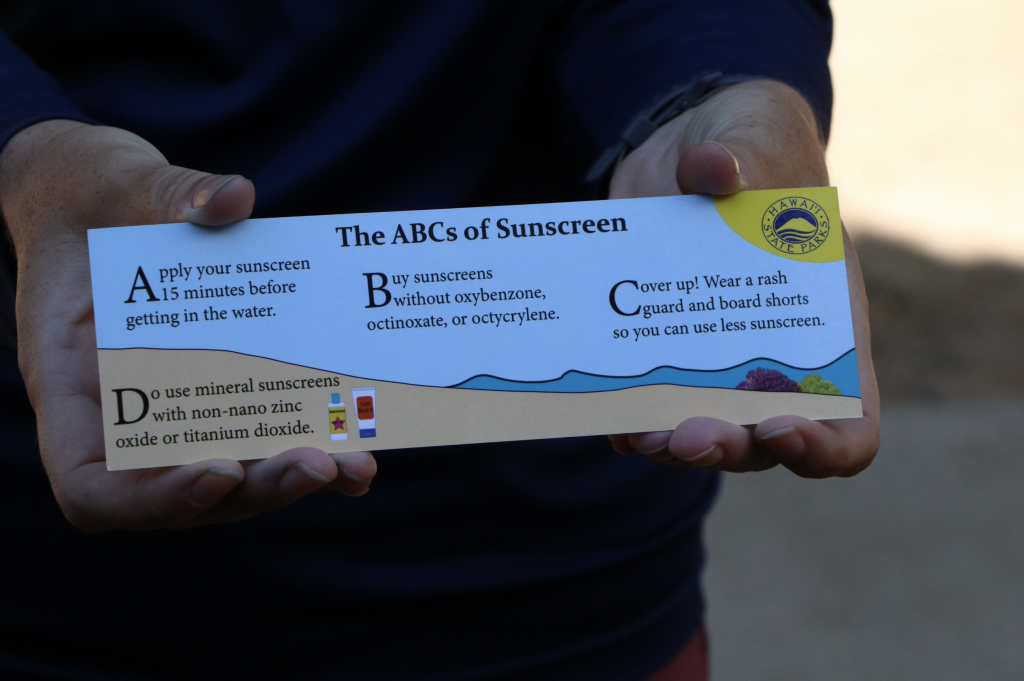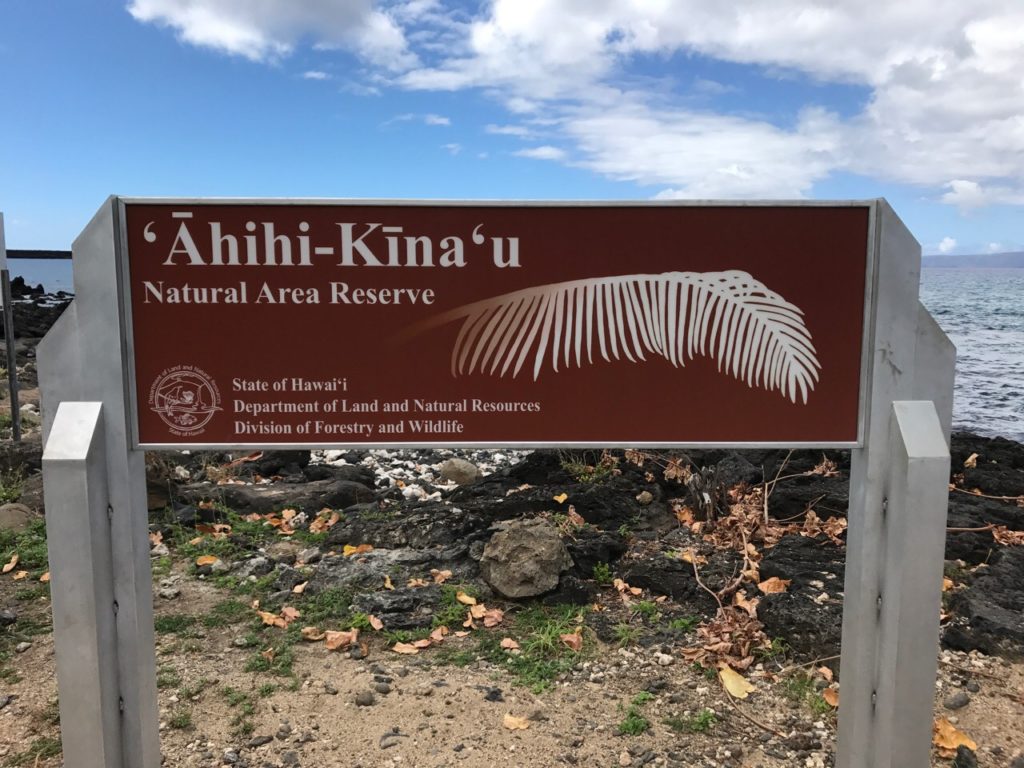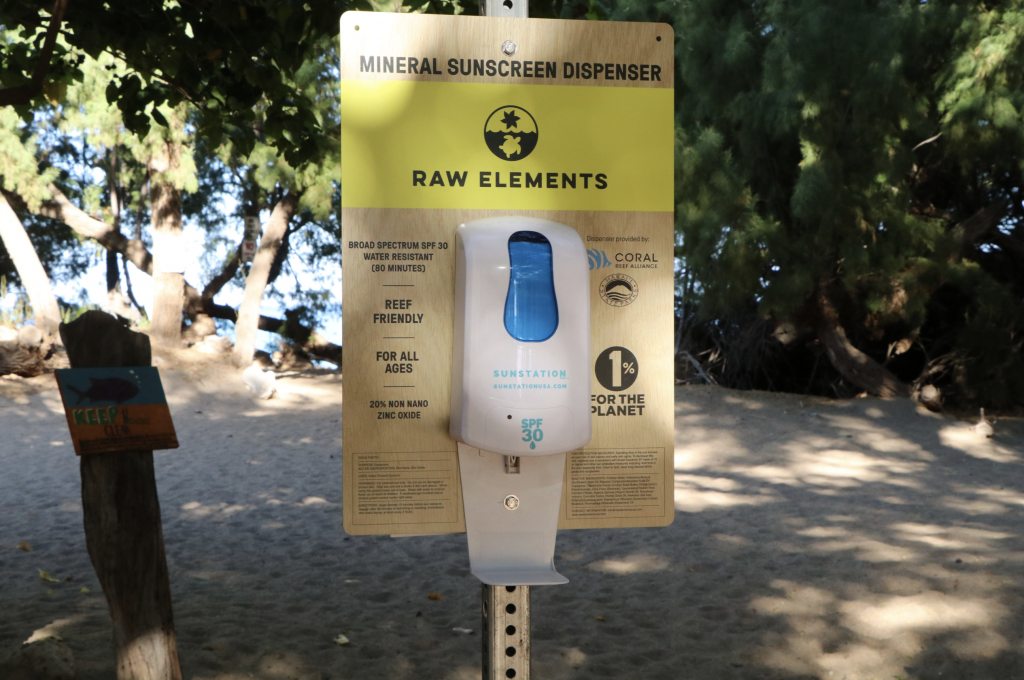Maui County Enacts Historic Bill Prohibiting Non-Mineral Sunscreens

Maui County continues to lead efforts to protect the environment with the enactment of a bill, prohibiting the sale, distribution, or use of non-mineral sunscreens.
Bill 135 was introduced by Maui County Council Member Tamara Paltin, and was signed into law as Ordinance 5306 by Maui Mayor Michael Victorino on Dec. 6. It will take effect on Oct. 1, 2022.
The bill recognizes that several chemicals in non-mineral sunscreens have recently been demonstrated to pose a threat to the health of coastal waters, coral reefs, and other marine species.

“Non-mineral sunscreens are an aggressive pollutant,” according to Council Member Kelly King. “Our coral reefs are our first defense against erosion from sea level rise and, in addition to the threats of climate change and ocean warming, runoff from storms and development, and seepage from wastewater injection wells, chemical sunscreens cause extensive harm to our reef systems and marine life. This ordinance is one important step toward protecting the health and resilience of our reef and marine life by removing a significant ecological stressor.”
Zinc oxide and titanium dioxide are known as “mineral sunscreens.” Non-mineral sunscreens include chemicals such as octinoxate, octocrylene, and oxybenzone. Of the 16 active ingredients currently used as UV filters in sunscreen products, only zinc oxide and titanium dioxide are deemed generally recognized as safe and effective (GRASE) by the United States Food and Drug Administration.
Administration of the new prohibitions is the responsibility of the County Department of Environmental Management. The sale, distribution, or use of prohibited non-mineral sunscreens will be considered a violation of the Maui County Code, subject to penalties and enforcement procedures. Fines will be deposited into the County Environmental Protection and Sustainability Fund.
“Mahalo to the Maui County Council for passing this important piece of legislation and to Chair of the Climate Action, Resilience, and Environment Committee, Kelly King, for introducing Bill 135. I signed the bill because it’s an important step to help revitalize the health of our coral reefs,” said Mayor Michael Victorino. “I’m very proud that the County of Maui is leading efforts to protect our vulnerable coastal marine ecosystem.”
“Ordinance 5306 is one part of the overall goal to make our tourism industry more ecologically sustainable and less harmful to our islands’ biodiversity,” King added. “There is a growing movement of skincare and beauty product companies that are looking to make a positive impact on the planet. This new law supports that movement toward conscious consumption by removing harmful products from the local market and encouraging consumers to choose truly reef-safe mineral sunscreens.” ʻ
“Our reefs are invaluable,” said King. “Coral reefs are essential for the livelihood of many residents of Maui County, the perpetuation of cultural practices, and the protection of coastal areas. Our marine environment provides opportunities for recreation, inspiration, and scenic beauty for residents and visitors. We must do what is necessary to preserve and protect it.”
The bill was supported by researchers, environmental organizations, local youth, the County Administration, and the Department of Land and Natural Resources.

While working at the ʻĀhihi Kīnaʻu Natural Area Reserve in South Maui, Jeff Bagshaw of the DLNR Division of Forestry and Wildlife became one of the earliest advocates of banning non-mineral based sunscreens. He testified before the County Council in support of the Maui ban.
“I’m so pleased Maui is leading the way in keeping harmful chemicals out of our ocean waters,” Bagshaw said. “We look forward to a time when 55-gallon barrels of chemicals that kill and damage coral reefs are no longer an issue. That’s the quantity of sunscreen chemicals experts have told us wash into Maui’s nearshore waters every day.”
His DLNR colleague Peter Landon, who manages ʻĀhihi Kīnaʻu Natural Area Reserve, was also an early supporter of the outright ban on non-mineral sunscreens. “You can see with your own eyes the sheen of chemicals shining in the top of the water column,” he said. “Imagine the impact this stuff has on the coral reef ecosystem. I and many others applaud the County Council for this landmark measure.”
Public information and education programs to inform residents and visitors about the new ordinance are planned. Increasing the amount of free sunscreen dispensers and developing a sunscreen trade-in program to exchange previously purchased chemical sunscreen for approved mineral sunscreen are other possibilities that have been discussed to assist with the successful implementation of this ordinance.

Kīhei Charter School students have been involved in researching this issue and are working on developing resources to educate the public on the new sunscreen law. “Using hands-on, interactive methods, our team worked collaboratively with 7th-grade science classes at Kīhei Charter School to gain a better understanding of the accessibility and use of reef-safe sunscreen on Maui,” said Thomas Cutt, executive director at Maui Ocean Center Marine Institute. “It was inspiring to see the level of engagement in the students and their willingness to participate in efforts to protect our coral reefs and educate the community.”
Dr. Craig Downs, a leading expert in the field whose groundbreaking research connected the use of non-mineral sunscreens to coral reef decline, recognized the historic nature of the law.
“Maui’s Ordinance 5306 is the first regulation in the United States that protects its natural resources from all the potential environmentally harmful petrochemical sunscreen ingredients, and only allows for mineral sunscreens,” said Downs. “This audacious measure should inspire governments the world over that wise conservation measures can help mold tourism to be ecologically sustainable and profitable, while ensuring the conservation of one of its most treasured natural resources.”

Councilmember King added, “I commend and thank the Council, the Mayor, and all supporters of this bold action, which is aligned with the Council’s recently adopted resolution to commit to protecting biodiversity.”
As the only Maui resident to participate in the United Nations global climate change conference in November, King was authorized by County Resolution 21-166 and a mayoral proclamation to sign the Edinburgh Declaration on the post-2020 global biodiversity framework on behalf of Maui County.
* This story was updated from its original version to accurately reflect the legislation’s author.








